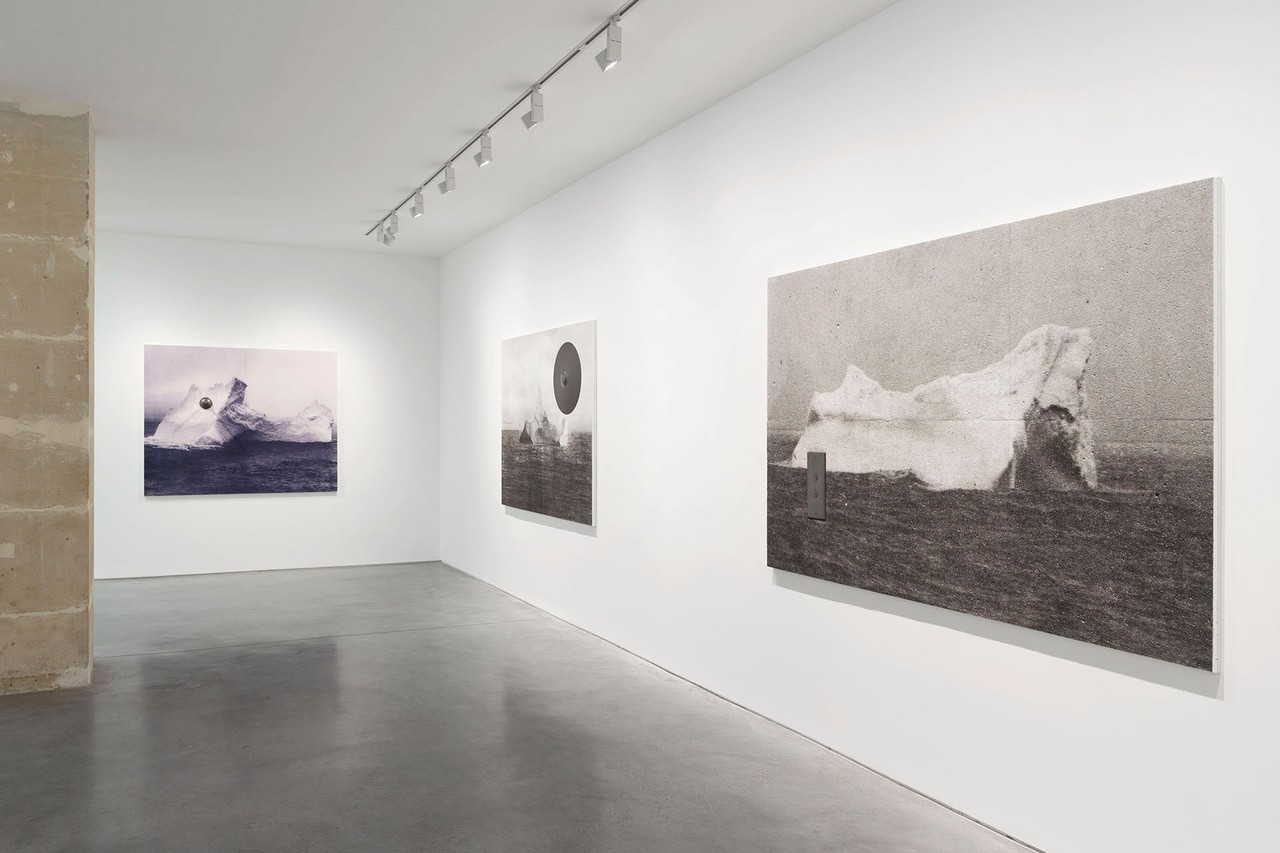Adam McEwen
Ice Ice Baby
13 Oct - 18 Nov 2017
ADAM MCEWEN
13 October – 18 November 2017
Art : Concept is pleased to present ICE ICE BABY by Adam McEwen. For his fourth solo exhibition at the gallery, McEwen exhibits a group of works made using his emblematic methods and materials – primarily cellulose sponge and graphite – newly combining them to achieve disconcerting effects
Stemming from the wreck and sinking of the Titanic in 1912, the show appropriates a group of historical photographs of the icebergs suspected at the time to have caused the disaster. These images, printed on a material that is both unexpected and deeply familiar (commonly found as kitchen sponge), claim both archival aspect and nostalgic imagery, creating a strange mix of historical gaze and subjective feelings. McEwen’s practice often delves into collective and cultural history and most particularly into its moments of failure and tragedies: one thinks of his gum paintings referring to German cities bombed in World War II (Bomber Harris, 2006-2010), his obituaries of living subjects, or his recreation in graphite of a family coffin carrier. McEwen’s work operates at the intersections of popular culture and personal mythology - in the case of the Titanic, his great-grand father was among the passengers who did not survived the shipwreck.
Avoiding morbid obsession, McEwen complicates our relation to death and disaster by injecting the funereal with humor and the uncanny. For whatever reasons, the wreck of the Titanic has ascended to the pantheon of disaster celebrity, a historical event that has become part of our popular imaginary, a trigger for both connection and detachment. McEwen exploits this paradoxical relationship by layering the historical imagery with three-dimensional objects that themselves possess a parallel notoriety: a toilet plunger, a drum cymbal or a hula hoop, each of which is, confusingly, just as well-known as the Titanic. The effect of this composite is to trigger a psychological unease, or to write a narrative which is uncontrolled and defined by the viewer, not unlike montage.
These absurd and often free associative confrontations – one might note the reference to the late 80s hit in the title of the show – inevitably create a new context for these icebergs. From suspects to victims, the icebergs are now subject to an impending disappearance, if not because of the sponge they are printed on, more surely because of another no less global and ongoing disaster. Born in London in 1965, Adam McEwen lives and works in New York City. His recent solo exhibitions include: I Think I’m in Love, Aspen Art Museum, Aspen (2017); Tinnitus, The Modern Institute, Glasgow (2016); Harvest, Petzel Gallery, New York (2016); Non-Alignment Pact, Art : Concept, Paris (2014). As curator, he has conceived various projects including Fresh Hell – Carte blanche à Adam McEwen at the Palais de Tokyo in Paris (2010).
13 October – 18 November 2017
Art : Concept is pleased to present ICE ICE BABY by Adam McEwen. For his fourth solo exhibition at the gallery, McEwen exhibits a group of works made using his emblematic methods and materials – primarily cellulose sponge and graphite – newly combining them to achieve disconcerting effects
Stemming from the wreck and sinking of the Titanic in 1912, the show appropriates a group of historical photographs of the icebergs suspected at the time to have caused the disaster. These images, printed on a material that is both unexpected and deeply familiar (commonly found as kitchen sponge), claim both archival aspect and nostalgic imagery, creating a strange mix of historical gaze and subjective feelings. McEwen’s practice often delves into collective and cultural history and most particularly into its moments of failure and tragedies: one thinks of his gum paintings referring to German cities bombed in World War II (Bomber Harris, 2006-2010), his obituaries of living subjects, or his recreation in graphite of a family coffin carrier. McEwen’s work operates at the intersections of popular culture and personal mythology - in the case of the Titanic, his great-grand father was among the passengers who did not survived the shipwreck.
Avoiding morbid obsession, McEwen complicates our relation to death and disaster by injecting the funereal with humor and the uncanny. For whatever reasons, the wreck of the Titanic has ascended to the pantheon of disaster celebrity, a historical event that has become part of our popular imaginary, a trigger for both connection and detachment. McEwen exploits this paradoxical relationship by layering the historical imagery with three-dimensional objects that themselves possess a parallel notoriety: a toilet plunger, a drum cymbal or a hula hoop, each of which is, confusingly, just as well-known as the Titanic. The effect of this composite is to trigger a psychological unease, or to write a narrative which is uncontrolled and defined by the viewer, not unlike montage.
These absurd and often free associative confrontations – one might note the reference to the late 80s hit in the title of the show – inevitably create a new context for these icebergs. From suspects to victims, the icebergs are now subject to an impending disappearance, if not because of the sponge they are printed on, more surely because of another no less global and ongoing disaster. Born in London in 1965, Adam McEwen lives and works in New York City. His recent solo exhibitions include: I Think I’m in Love, Aspen Art Museum, Aspen (2017); Tinnitus, The Modern Institute, Glasgow (2016); Harvest, Petzel Gallery, New York (2016); Non-Alignment Pact, Art : Concept, Paris (2014). As curator, he has conceived various projects including Fresh Hell – Carte blanche à Adam McEwen at the Palais de Tokyo in Paris (2010).

